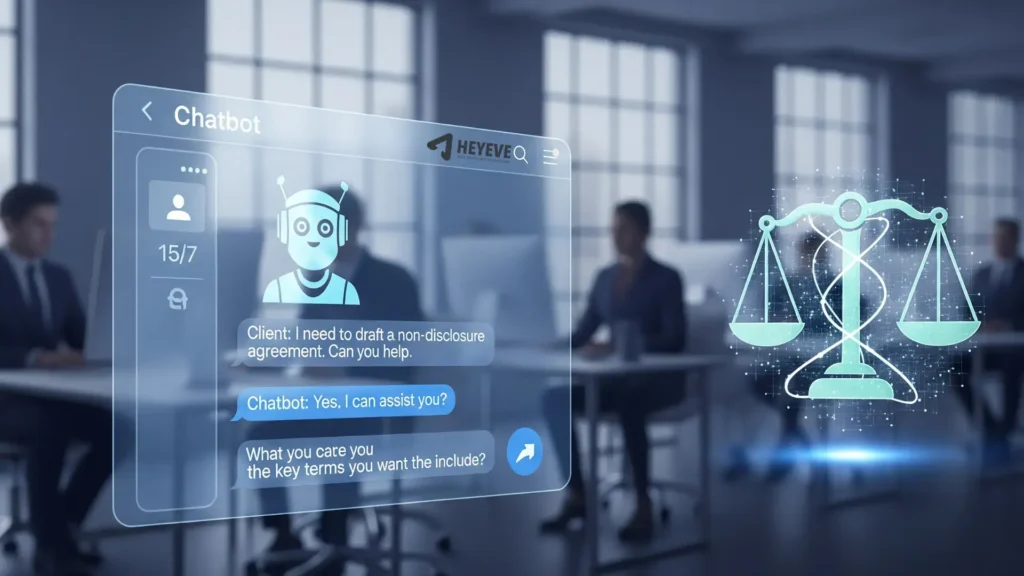“What is the sense of continuously being asked the same questions?”
Here is the question that you have likely asked yourself if you are a busy lawyer or firm manager. The fact is, most legal teams spend hours a week on routine jobs- scheduling calls, responding to frequent questions, and pursuing documentation.
But what if AI can do all of that on your behalf?
That is precisely where legal chatbot applications come in: to save time, enhance customer experiences, and relieve your team so that they can get back to actual legal work.
What is a Legal Chatbot?
A legal chatbot is an AI assistant that aids law firms in automating discussions. It is a virtual receptionist-style chatbot. It talks to people who visit your website, answers their questions, gathers client information, and can even assist with legal documents.
Such bots rely on natural language processing (NLP) to interpret and communicate with users in real time. You can think of it as a 24/7 employee that never tires or misses a message.
Lawyers need not worry that they will be replaced by them. Rather, legal chatbot applications are assisting in making routine duties more efficient, thus quickening and standardizing legal services.
Related: https://heyeve.ai/blogs/ai-training-chatbots-for-lawyers/
The Rise of AI in Legal Services
AI is not a technology buzz anymore, and it is transforming the way law firms operate daily. A report by Thomson Reuters indicates that in the U.S. alone, more than 35 percent of law firms are currently utilizing some type of AI. And chatbots are fronting the process of client-facing automation.
Why? Since law operates under much repetition, document requests, appointment scheduling, and FAQ are involved. It is just the type of work that AI is best at.
Legal chatbot use provides an easy way for firms can begin to utilize AI without significant expense or upheaval.
Why Law Firms Are Turning to Chatbots
Efficiency is the key reason why law firms are embracing the use of chatbots.
These are the things that legal chatbot applications assist with:
- Cut the administration burden
- Answer clients immediately, around the clock
- Automation of lead capture and qualification
- Improve customer satisfaction through quicker services
- No more time-wasting or high expenses —–human touch is not eliminated
The law firms that employ chatbots are capable of serving a greater number of clients, delivering the service quickly, and yet at a professional level in a competitive field. It is a minor technological change that brings a major competitive edge in business.
Core Legal Chatbot Applications for Law Firms
Legal chatbots are used much more than for simple FAQ answering. When properly utilized, they will change how law firms work, saving time and improving client experience. The following is the essence of how law firms currently employ chatbots:
Client Communication
Clients want immediate solutions, and that is a fact.
A legal chatbot could engage in conversation with visitors to your site at any time of day, and may offer instant answers to frequently asked legal questions, describe services, or direct them towards the next appropriate action (such as scheduling a consultation).
Be it “Do you handle divorce cases”? Or “How much do you charge”?- the chatbot will provide answers immediately, which means that potential clients will stay on the line and will not require a human to be engaged all the time to provide basic information.
Drift report on the State of Conversational Marketing revealed that 82 percent of users expect an immediate response, and chatbots can assist law firms in providing just that.
Lead Generation & Qualification
Any law firm would wish to have more leads; however, not every lead is suitable.
Legal chatbots are useful in screening by asking questions such as:
- “What kind of legal assistance are you in need of?”
- “Are you currently collaborating with a lawyer?”
- “What is your preferred time for consultation?”
This separates the unqualified leads, and only serious prospects reach your intake team. The bot is also able to capture contact information and drop it directly into your CRM, no manual data input required.
Client Intake & Onboarding
Onboarding a client may be a nightmare of paperwork. However, when chatbot automation is involved, it is trouble-free and easy.
What your bot can do:
- Gather client information
- Distribute intake forms.
- Make appointments.
- Make reminders
Rather than playing phone tag and email tag, it all occurs via an organized, casual conversation. Your clients will feel guided (and you will save hours with your team).
Legal Document Drafting
Automated document generation has become possible in many legal chatbot applications. The bot provides guided questions, and then templates are filled in regarding:
- NDAs
- Forms of power of attorney
- Lease agreements
- Cease and desist letters
It is particularly helpful when it comes to companies that provide flat-rate services or do-it-yourself legal services. Complex drafting requires a human touch in the form of a lawyer, but bots have no problem with the basics.
- Bonus: You can even connect such tools as DocuSign or PandaDoc so that a client can sign directly.
Interested in seeing more clients- without increasing the number of hours?
Interested in seeing more clients- without increasing the number of hours?
It becomes possible with legal chatbots. Get acquainted with real applications and find out how they suit your company.
Case Status Updates & Notifications
It is imperative to keep the clients informed (and quite time-consuming as well).
Updates that can be automatically sent by chatbots include:
- “The court date is set for June 20th.”
- “Kindly load the missing document.”
- “Your case has been looked at by your lawyer.”
This increases transparency and trust and decreases the number of “Can I get an update?” calls your staff has to get.
Legal Research Assistance
Although bots will not substitute substantive legal research, they may be used to help clients with:
- Legal terms definitions
- Useful legal reference links
- Abstracts of state common laws
There are even some sophisticated bots that can link to legal databases to assist users in comprehending what is relevant to their type of case, particularly useful in legal aid or high-volume practices.
Internal Automation (Time Tracking & Due Diligence)
Chatbots are not only for pleasing the clients but also your staff.
The legal chatbot applications can be used to:
- Put a reminder to attorneys to record billable hours
- Follow up on case developments or deadlines
- Look up document compliance in due diligence
- Internal job assignment through chatbot prompts
This assists attorneys in keeping up with internal processes, and nothing slips between the cracks.
A 2023 report by Clio found that firms that use automation to handle internal processes have saved up to 40% of their time.
Collectively, these applications demonstrate the potential strength of legal chatbots, not as a tool, but as an automated member of your team that will help your firm operate smarter, faster, and more efficiently.
Examples of Legal Chatbots in Action
Curious to see what legal chatbot applications look like in practice? Some of the popular ones already having an effect are as follows:
Indiana Legal Help
This chatbot asks a user a set of questions in order to provide him or her with the appropriate legal resources or forms, which is ideal in cases where an individual cannot afford a lawyer.
LawHelpNY
LawHelpNY chatbot was developed to serve low-income and non-English-speaking users and allows people to access free legal assistance and legal information, as well as service providers in New York.
Oikonomakis Law
It is an international law firm that implemented a chatbot to pre-qualify leads and book consultations, and it decreased the number of leads requiring manual follow-up, making the process of the first contact more streamlined.
Legal Help Firm
This firm chatbot is focused on the enhancement of the client intake process, as it makes the process of onboarding a client much more convenient, as the user is not required to call or send an email; instead, they can submit the information about their case through the chatbot.
All these examples demonstrate that chatbots can help law firms not only assist clients but also improve the optimization of internal processes.
Suggested Read: https://heyeve.ai/blogs/ai-training-chatbots-for-lawyers/
How to Build an Effective Legal Chatbot
Although creating a chatbot might seem complicated, it does not have to be. Here is a basic setup instruction to help you:
Define workflows
First things first: what tasks do you want the chatbot to perform? Lead generation, FAQs, or intake? Outline the steps of the interaction.
Integrate with firm systems
To ensure that the bot can deliver data where it is required, make sure it is connected to your calendar, CRM, or case management system.
Ensure compliance
Make use of disclaimers. Avoid accepting legal advice from the bot. Prioritize data security and privacy, particularly when dealing with sensitive customer information.
Add human fallback
Provide a chance to talk with a real person always. This increases trust and makes sure that users receive assistance when the bot encounters its boundaries.
Test and iterate
No chatbot will be perfect on the first day. Put it in front of real users and see what happens in the conversations and optimize the flows accordingly.
Pro Tip: With Tidio or ChatBot.com, you can easily create legal chatbot scenarios using a drag-and-drop editor, no code required.
Related: https://heyeve.ai/blogs/ai-chatbot-development-2025/
Final Thoughts!
Legal chatbot applications are not a mere nice-to-have feature anymore, as their use becomes a staple of the modern law firm.
They help:
- Save time
- Enhance customer satisfaction
- Mechanize routine labour
- And provide your company with a technology advantage
So, if you are a solo lawyer or manage a multi-location practice, you can enhance your operations overnight by starting with a single chatbot flow, such as intake or frequently asked questions.
And with growing expectations of the clients, it is no longer a choice to be available 24/7 but rather a norm.
Now, therefore, it would be a good time to consider the chatbot automation and make your legal services more seamless, intelligent, and ready for the future, should you be on the fence.


